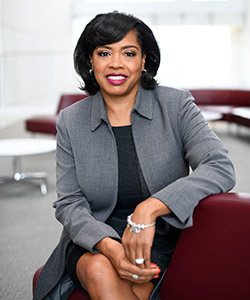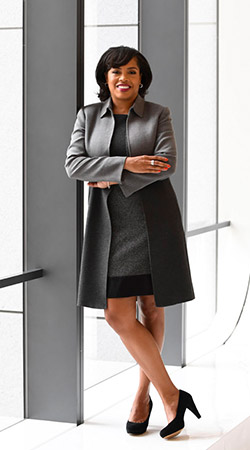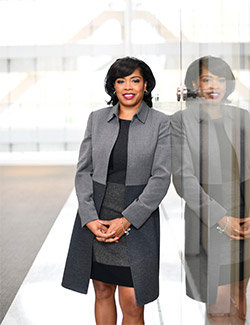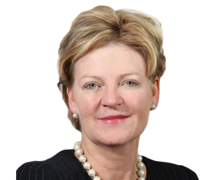Michele Meyer-Shipp: Paying It Forward Every Day
PDJ recently caught up with Michele Meyer-Shipp, Akin Gump’s chief diversity and inclusion officer, who was generous enough to grant us an interview. We wanted to share her thoughts about career, leadership, diversity, and success with you.
Michele, how did you become the leader you are today?

There are three key things that I’ve done that have helped me grow into the leader I am today. The first key is working hard at my craft. For example, when I practiced employment law, I became the best employment lawyer I could be.
The second key is building relationships and learning how to connect with people. I have found that building relationships, developing trust, and collaborating with people is critical to becoming a good leader.
The third key is taking calculated risks. My risks not only included making decisions regarding job opportunities, but also raising my hand and volunteering to do things that were outside the scope of my job. My risk-taking helped me gain confidence and get noticed as a leader.
What obstacles have you encountered and how have you overcome them?
Things I first saw as obstacles, I now look at as opportunities. On two occasions, I was out of a job because the organizations I worked for were downsizing. Each time, the experience brought me to a screeching halt. I had two jobs I loved, and I thought I was set for the rest of my life. Then suddenly, I got a call saying that senior leaders were making changes and I was out of a job
At first, I was in shock and not able to accept my new reality. Then, I felt helpless, thinking, “What am I going to do?” But eventually, I realized that everything happens for a reason, and I had an opportunity to do something exciting. But for those two “obstacles,” I might not be where I am today. Those experiences helped me become resilient and proactive.
What is your greatest professional accomplishment?
I think it is that I have been able to help organizations drive organization-wide change. I’ve realized over the years that I’m pretty much a change agent—helping organizations address problems or seize opportunities.
For example, when I became chief diversity officer at Prudential, I was immediately asked to build, launch, and implement a global, firm-wide diversity strategy. I’d never done it before—I had to figure it out. But, looking back six years later, I see that not only did I achieve that goal, I was also able to get hundreds of people engaged—taking ownership and being accountable for driving the strategy. It was amazing.
A second example involved an agency with serious employment-law issues. Within a year of being hired, I was able to help them address their employment-law and other employment-related issues, and mediate disputes. I also helped develop new HR policies and procedures, and treat people in a way that set them up for future success.
How important has the advice and support of mentors and others been to your career success?
I have what I call a board of mentors. Honestly, I have a hard time making decisions, and when I’m not sure which opportunity to follow, I call on my mentors. They act as a sounding board and help me see what I can’t see. They help me appreciate different points of view and guide me in making key decisions.
How do you share your knowledge and wisdom with other women?
I pay it forward in many ways. I take on as many mentees as I can—meeting with people on the weekends and after work. I mentor coworkers and folks just starting their careers, as well as college and law school students. In fact, because I have kids in high school, I’ve been tapped on the shoulder by their classmates. For some reason, people come to me and ask me for career and educational advice. And I am absolutely happy to pay it forward.
Over the past couple of years, I have been asked by senior leaders how they can navigate sensitive issues around D&I. Given the current climate and the things that are happening in society, I’ve had pretty senior people call me up and ask, “How do I handle this situation?” or “Help me understand this issue.”
People have paid it forward for me. Now, I owe it to others.
What are the three or four most important qualities a woman leader needs to cultivate?
There are a lot of qualities that are important, but with regard to women leaders, I thought about the following three traits:
- Confidence
- Agility/flexibility
- Emotional intelligence/authenticity

Confidence, especially for women, is crucial. Research shows that men are likely to apply for jobs when they have only 50 percent of the qualifications, whereas women will look at the same job and say, “I don’t have two of the ten qualifications. I’m not going to apply.” Research also shows that a man is much more likely to raise his hand and offer an idea than a woman is.
I know from my own experience that women are not inclined to ask for what they want. I have to remind myself, “Michele, you have to ask. The worst they can say is no.” So, I think that confidence is a critical quality for everyone, but particularly for women.
Agility involves being flexible and open to new challenges and opportunities. In my own situation, I moved from law firm to government, to corporation, and back to law firm. If I had not been flexible, I would never have stepped into those different environments.
Authenticity is critical. Being your authentic self is crucial for building lasting, collaborative relationships. People will see right through you when you’re being phony or not fully present.
It’s vital that we learn to be emotionally intelligent, not only about others, but also about ourselves. We human beings exercise a lot of negative self-talk. We also have a habit of not really listening to others and not reading social cues, such as body language. Any leader worth her salt will be thoughtful about what it means to be emotionally intelligent, and about cultivating and developing her own emotional intelligence.
What is your personal philosophy for success—at work or in life?
Live a good life, love what you do, love the people around you, and try to have a good time while you’re doing it. Being present in the moment, especially these days, with all the distractions around us—electronics, text messages, cell phones, computers, and all of that—is difficult. But, remember: Tomorrow is not promised, so surround yourself with people who nurture and build you, and who you get along with. That’s how I live my life.
What advice would you offer women who are looking to build successful and satisfying careers?
Know your craft. Be diligent, be thorough, and be thoughtful in all you do. Don’t put yourself in a position where anyone can call that into question.
Find your brand and your image. Be thoughtful about that. What is the brand and the image you are trying to project? Research shows that when people meet you, they form an impression about you in the first seven seconds. So, you have to be aware of the image you project.
Make sure you’re building relationships and getting exposure. Build your internal and external networks because, quite candidly, as you move up your career ladder, relationships will be key. Every job I’ve had has come about through a relationship.
Also, and this took me until the age of about 40 to figure out, I have learned to trust my gut. When something stays with me or something is bugging me, I need to honor that. If you are able to, do work that you are passionate about. And, especially for women, if you have children or are caring for an aging parent, pay attention to work/life integration.
Why do you personally value diversity and inclusion?
As a woman of color, diversity and inclusion is something I live with and experience every day. Working as an attorney, I was often one of the only women or people of color in the room, so D&I was always an element of whatever was happening. The subject is very, very personal to me, and I’ve spent a lot of time educating people about diversity and valuing differences. The subject is real to me because it’s my part of my everyday life. I have learned that when you appreciate and value differences among people, you have better relationships, you learn more about others, and life becomes more interesting—richer.
How is diversity and inclusion important to business?
More than ever, D&I is a business imperative. Many organizations today are working across countries and cultures. So to continue to be profitable and grow, they have to be able to navigate diversity and inclusion. Even here in the United States, we are becoming ever more diverse, so it’s important that we understand the people we encounter and work with. We must learn to value what we all bring to the table and appreciate what we can learn from each other, because we don’t live another person’s experience. This understanding will drive better collaboration—working together in a way that produces more innovative solutions, which will help businesses grow.
How are you and your organization initiating, leading, and supporting diversity efforts that benefit your employees, your vendors, and your customers?
Although I’ve only been with Akin Gump for a short time, I can tell you that I’m very impressed. It is one of the few global law firms with a woman chairperson. She and firm leadership are personally committed to diversity and inclusion. Akin Gump has made a concerted and proactive effort to diversify the workforce and attract diverse talent by partnering with law schools and other external organizations.
Four years ago, the firm launched a diversity scholarship program called Akin Gump/Robert Strauss Scholarship. The firm partners with organizations to recruit diverse college and law students, and with several diverse bar associations, not only to access diverse talent, but also to send our diverse attorneys for professional development and potential client-development opportunities, and to build our brand as a firm committed to diversity and inclusion in the legal profession.
Internally, the firm has built a very nice platform with the firm-wide diversity committee, which now has reached into the committees in all of Akin Gump’s offices, where they are raising awareness around diversity and inclusion. For example, they’ve rolled out a firm-wide unconscious bias program, which is helping people understand what bias is, how it shows up, and how to navigate it. In addition, it’s driving programming to raise awareness of the different cultures and backgrounds in all the places where we do business.

Michele Meyer-Shipp
Chief Diveristy and Inclusion Officer
Michele Meyer-Shipp, who recently joined Akin Gump Strauss Hauer & Feld LLP as its first chief diversity and inclusion officer, will guide diversity programs and initiatives across the firm. Until recently, she served as vice president and CDO at Prudential Financial Inc.
She has served as general counsel for the Waterfront Commission of New York Harbor, employment counsel and leader of diversity and inclusion efforts for Global Wealth Management at Merrill Lynch, and director of New Jersey’s Division of Equal Employment Opportunity and Affirmative Action.
Meyer-Shipp earned her JD at Seton Hall School of Law and her bachelor’s degree in criminal justice at Rutgers University. She also attended the Global Strategic Leadership Program at The Wharton School of the University of Pennsylvania.







